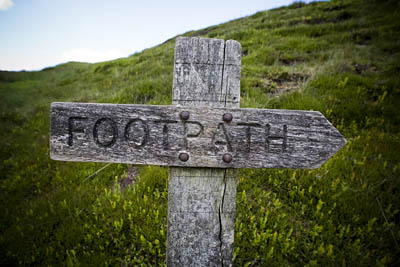
An estimated 20,000 routes are at risk of being lost
The Government has given a stay of execution on the threat to thousands of unrecorded rights of way.
Walkers, cyclists and horse riders may lose their rights along an estimated 20,000 footpaths and bridleways in 17 years time because of a provision in the right-to-roam law passed in 2000. A scheme to record these was a dismal failure, with not a single footpath added to official maps.
Because of the threat, Ramblers’ senior policy officer Janet Davis petitioned the Prime Minister to repeal the sections of the Countryside and Rights of Way Act that would mean the loss of these thousands of pathways to walkers and riders in England and Wales.
The e-petition to Gordon Brown said: “The Government-funded project to assist with the researching and recording of these routes has been terminated without recording a single path but when the Countryside and Rights of Way Bill was going through Parliament the then Minister, Michael Meacher said: ‘ … we do not intend to [bring definitively to a close the exercise of determining the rights of way network] without ensuring that there are adequate resources to make it possible for all existing paths that can reasonably be found to be found.’
“The public therefore had a legitimate expectation that something would be done to record the so-called lost ways. Now that the promised resources have been withdrawn repeal of the cut-off date is essential.”
In reply, the Government pointed out that a working party has been set up to look into the problem. No 10 said: “After Natural England’s review of the Discovering Lost Ways Project, it was decided to set up a Stakeholder Working Group to look at the various issues surrounding the completion of the definitive map.
“The group brings together key interests nationally to agree a package of reforms in this area. We believe that this group presents a unique opportunity for rights of way stakeholders, whether they represent users, local authorities or land managers, who are equally represented, to work towards a new framework they can all support.
“While this does not mean that Government is, at this stage, committing to any further legislative reform, it will be an excellent opportunity to feed in any ideas for improvements which may help improve the recording and establishment of public rights of way.
“This does not necessarily mean throwing away the processes already in place, but rather identifying where difficulties lie and finding ways of overcoming them.
“What comes out of the Stakeholder Working Group depends very much on the participants and their willingness to work together to come up with effective and mutually acceptable solutions – whatever these might be.
“In the meantime, we have agreed not to pursue implementation of the cut-off date provision in the Countryside and Rights of Way Act 2000, at least until the Stakeholder Working Group has reported on its proposals which we expect to be completed by the end of 2009.”
Ms Davis welcomed the postponement of the cut off. She said: “By the time the petition closed on 1 July 2009 nearly 6,500 people had signed. That made it overwhelmingly the best signed petition in the ‘environmental’ section of the Downing Street website.
“It collected near double the amount of signatures of its closest runner in the category, before it closed. Many thanks to everyone who signed.
“We are very pleased that the Government has re-affirmed its commitment not to pursue the implementation of the cut-off date until after the Stakeholder Working Group has reported.
“The Ramblers is part of that group which comprises representatives of user groups, landowners and local authorities. We are hopeful that a number of constructive ideas will be presented to the government by the end of the year which will improve the legislation surrounding the recording of paths on definitive maps, to the benefit of all concerned, so that the need for a cut-off date is either removed or its effect on the network of unrecorded routes reduced.”
The Discovering Lost Ways project, which was meant to record some of the pre-1949 rights of way that have been missed off definitive maps, closed after a review found that its task was too great for a research project of its type. It found that, far from being ‘lost’, more than half of the paths were visible, but not recorded on maps.
Initial submissions to the working group set up after the winding up of the project closed in March this year. Further details of the Stakeholder Working Group can be found on the Natural England website.